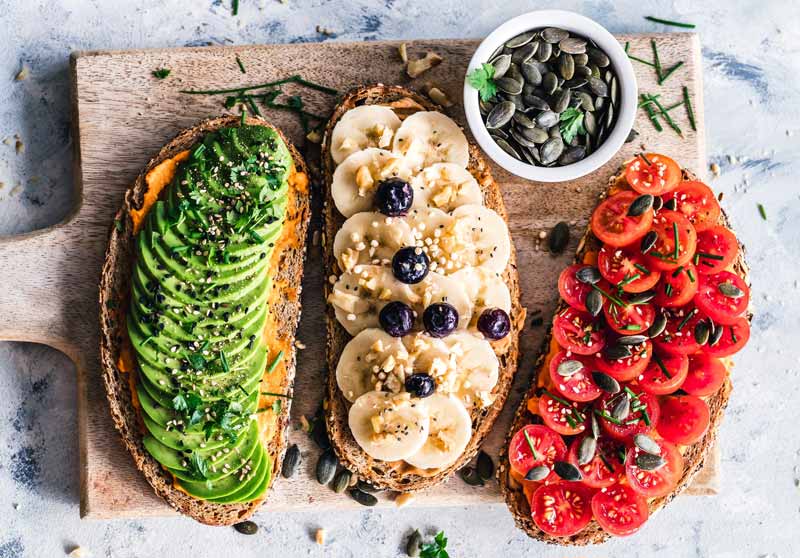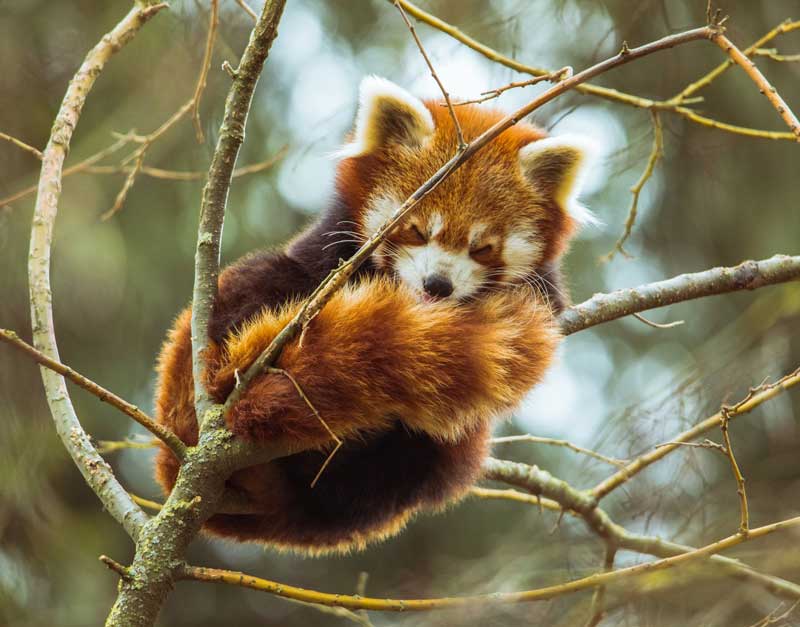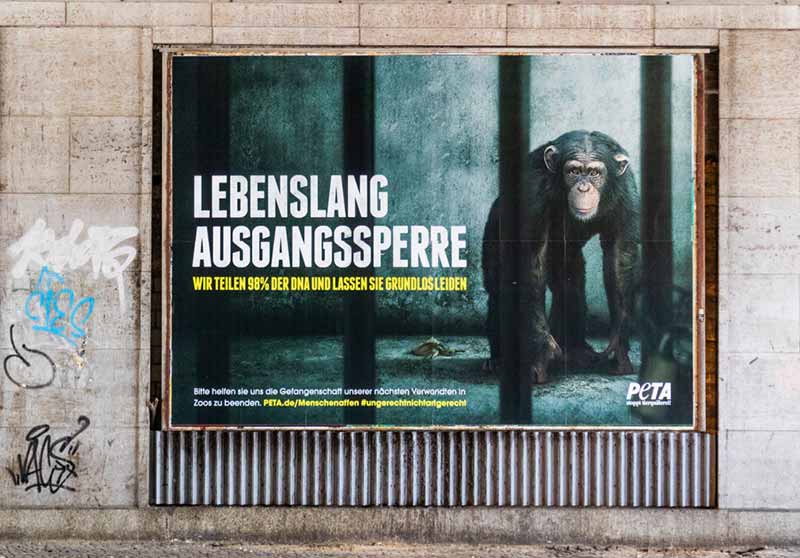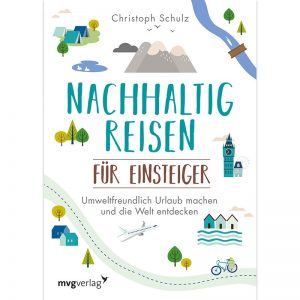Wondering what you can do about species extinction? Dann hast du eine wirklich großartige Einstellung und bist hier genau richtig! Tatsächlich ist jede achte Tier- und Pflanzenart akut vom Aussterben bedroht. Etwa 500.000 Arten haben bereits heute den Lebensraum, der für ihr langfristiges Überleben notwendig wäre, an uns Menschen verloren.1
Unter anderem, weil minütlich Regenwald für den Anbau von Nutztierfutter oder Palmöl weichen muss – oder weil wir ganz grundsätzlich die globale Erwärmung durch unser alltägliches Verhalten verschärfen. Doch wir alle können etwas dafür tun, dass die Biodiversität auf diesem Planeten erhalten bleibt.
In this article, I would therefore like to give you some valuable tips on how to increase your personal share of the Environmental problem species extinction effectively. Let's go!
10 tips: What to do about species extinction?
We are shockedwhen we realize that the last female Sumatran rhino died in Malaysia und die Tierart somit ausgestorben ist. Und wir können nur schwer mit ansehen, wie ein verhungernder Eisbär mit letzter Kraft versucht, etwas Fressbares aufzutreiben.
Doch in der gleichen Zeit tun wir (meist unbeabsichtigt; siehe „inkonsistentes Verhalten“) auch Dinge, die eben genau das jeweilige Übel provozieren. But as soon as we know what we did wrong, we can behave better.
Hier sind nun die versprochenen Tips, mit denen du im Grunde täglich das Artensterben stoppen kannst.
1. Reduce or stop meat consumption

The enormous Land consumption for animal feed cultivation and grazing areas, the Factory Farming, die für 14,5 Prozent aller weltweit von Menschen verursachten Treibhausgase verantwortlich ist2, die Fischindustrie, die dafür gesorgt hat, dass etwa 90 Prozent aller Fischbestände maximal befischt oder bereits überfischt sind3, tragen extrem stark zum Artensterben bei.
Der Konsum von tierischen Produkten wie Fleisch, Eiern und Kuhmilch ist wesentlicher Treiber the Deforestation, the Overfishing of the seas and of the Climate change - and thus also of the global decline in the number of animal and plant species.
So, if you want to stop species extinction, your first step should be to increase your Reduce meat consumption and in the best case the Stop consumption of animal foods altogether.
Für einen guten Start kann ich dir das Buch "Vegan nutrition for beginners" (is available here*) mit theoretischem Wissen und leckeren Rezepten ans Herz legen.
Hier sind außerdem einige motivierende und weiterführende Artikel, die dir helfen können:
2. Renounce palm oil
The global Consumption of palm oil is steadily increasing and almost tripled from 2002 to 2022.4 Neben der Viehwirtschaft ist er ein weiterer, entscheidender Grund für die Abholzung der Wälder und den schrumpfenden Lebensraum einer Vielzahl von Tier- und Pflanzenarten.
Natural rainforests have to make way for monotonous, lifeless palm oil plantations – für ein billiges Öl, das heutzutage in fast jedem Supermarktprodukt steckt. (mehr unter How palm oil destroys the rainforest)
Versuche deshalb gezielt auf den Kauf von Lebensmitteln mit Palmöl zu verzichten. Ob Sodium Lauryl Sulfate, Ethyl palmitate, Palmolein or Palmitic acid – Palmöl hat viele Namen und ist in der Zutatenliste von Supermarktprodukten oft schwer zu entdecken. Nutze deshalb einfach die App CodeCheck, mit der du den Barcode scannen und Palmöl-Produkte gezielt enttarnen und vermeiden kannst.
3. Live more climate friendly
The world's climate has a decisive influence on the diversity of animal and plant species on earth. We humans are the reason that the Climate changed so drastically and quicklyThe result is that most species cannot even begin to adapt to the changed conditions.
Wissenschaftler:innen prognostizieren unter anderem, dass bei einer globalen Temperaturerhöhung von 2°C gegenüber dem vorindustriellen Niveau etwa 99 Prozent aller Corals disappeared in the sea sein werden. Diese sind wiederum Lebensraum für eine Vielzahl von Meerestieren, die wiederum in der Nahrungskette unter größeren Meeressäugern liegen.
In order to Climate Change aufzuhalten, ist es wichtig, dass wir alle gemeinsam live more climate-friendly. Dies gelingt zum Beispiel durch den Verzicht auf tierische Lebensmittel, aber auch mit Hilfe der folgenden, further tips and articles from the blog:
- Reduce food waste
- Buy regionally
- Seasonal shopping
- Stop coral dieback
- Live car free
- Sustainable driving
4. Garden sustainable design
Kennst du diese grauen Schottergärten, die viele Gartenbesitzer:innen anlegen, weil sie low-maintenance gardens bevorzugen? Falls nicht, schau dir unbedingt das Buch Gärten des Grauens* an. Und falls ja: Gruselig, findest du nicht? Dass sich immer mehr Menschen für solche leb- und geräuschlosen „Gärten“ entscheiden, ist ebenfalls ein entscheidender Grund für das globale Artensterben.
Durch sie schwindet die Food base for many bird species - and also the Shelters are subsequently extremely rare.
Wenn du etwas gegen das Artensterben tun willst, solltest du deinen Garten (oder auch Balkon) lieber zu einer echten Oase der Artenvielfalt machen und relaxing sounds of nature wie das Wildbienensummen oder Vogelgezwitscher aus der Hängematte genießen. Zum Beispiel mithilfe dieser Wildblumensamen* und der Pflanzung von bird-friendly trees.
Nutze gerne auch die Tipps aus diesen further articles:
- Garden sustainable design
- Bee pasture garden - how to do it
- Create bird friendly garden
- Bee-friendly roses for the garden
5. Go vegan

Es ist das eine, den Konsum tierischer Lebensmittel zu beenden. Doch wenn du das Artensterben vollständig stoppen willst, solltest du noch weiter über den Tellerrand hinausschauen und vollständig vegan life.
Es gibt nämlich einen wesentlichen Difference between plant-based diet and veganism: Pflanzliche Ernährung ist eine Ernährungsweise, während der Veganismus eine Lebenseinstellung ist. Veganer:innen wollen die Stop animal exploitation altogether.
For example, they also do not wear jackets with fur collars, do without Zoo visits and also on the Circus with animals. And Vegan:inside also do not eat honey. This way of life counteracts the extinction of species even more purposefully. Lions, elephants and other wild species can remain in their natural habitats and reproduce.
Und krankheitsanfällige, gezüchtete Honigbienen übertragen seltener Krankheiten auf die Wildbienenpopulationen, sodass die vegane Lebensweise auch das Stop insect mortality can.
Versuche also, vegan zu leben. If you still lack the motivation to do so, then be sure to check out the article now with my personal reasons for veganism an. Und nutze gerne auch wieder das Buch "Vegan nutrition for beginners" (is available here*) mit theoretischem Wissen und leckeren Rezepten.
Tip: The Dominion film revolves around the topic of factory farming. It has personally opened my eyes and provided lasting motivation for a vegan lifestyle.
6. Organic shopping
Modern agriculture uses on a large scale Pesticides ein, um Unkraut und Schädlinge zu bekämpfen und um kurzfristig höhere Erträge zu erwirtschaften. Langfristig schadet diese Maßnahme den Erträgen jedoch, da parallel auch Nützlinge wie Wildbienen verschwinden und die Bodenfruchtbarkeit abnimmt.
If you have the Biodiversity fördern möchtest, solltest du lieber bevorzugt auf plant food from organic farming setzen. Ich gehe dafür beispielsweise regelmäßig auf den Wochenmarkt, da dort auch die Bäuerinnen und Bauern aus der Region ihre Produkte verkaufen. Selbstverständlich findest du sie auch im Biomarkt oder in klassischen Supermärkten.
7. Rethink your consumption
You want to stop the extinction of species? As long as our daily consumer behavior is itself part of the problem, we should of course start with ourselves first. For example, we produce a lot of Plastic waste entering the environment and jedes Jahr Millionen von Meerestieren das Leben kostet.
Ob Geschirr oder Becher aus Plastik – oder ein anderes Konsumgut: Bei jedem Kauf sollten wir uns fragen, ob wir diese Sache wirklich benötigen.
Das gilt selbstverständlich nicht nur für Einwegprodukte, sondern zum Beispiel auch für Mitbringsel aus dem Urlaub oder Kleidungsstücke. Muss es wirklich das Vacation souvenir from ivory or the Fur coat and Leather sein? Es gibt immer tier- und artenfreundliche Alternativen, sodass die ehrliche Antwort im Regelfall ein klares „Nein“ ist.
Just use the following, further articles, to learn more about these examples and the opportunities for more sustainable, animal-friendly consumerism:
- Nachhaltig konsumieren – Tipps & Tricks
- The truth about the fur industry
- Sustainable souvenirs on vacation
- Zero Waste Tips
- Distinguish real fur from artificial fur
- Why don't vegans wear wool?
- Living minimalist - Here's how
- Plasticfree lifestyle
8. Start and sign petitions
Now you have learned many tips that you can implement at home. In order to promote biodiversity, you can now get other people involved. A good opportunity for this is the Unterstützen oder Starten von Online-Petitionen. In the process you collect digital signatures against a specific grievance oder für ein bestimmtes Vorhaben, das den Artenschutz betrifft.
For example, you can apply for the End of whale watching in the Faroe Islands or against the agricultural use of the pesticide glyphosate strongly to support the "Volksbegehren Artenvielfalt".
Tip: Ich habe dir hier eine Liste nachhaltiger Petitionen that you can sign to make a real difference against species extinction and many other challenges and ills of our time.
9. Support animal and nature conservation organizations
Du allein kannst also im Alltag dazu beitragen, dass unzählige Tier- und Pflanzenarten nicht weiter bedroht werden. Doch es gibt auch noch großartige Organisationen, die jeden Tag im großen Stil für den Schutz der Artenvielfalt kämpfen und immer Unterstützung gebrauchen können. Helfen kannst du sowohl in financial but also in energetic form.
Here are some organizations that you Promote in the fight against species extinction can:
- Nature and Biodiversity Conservation Union Germany (NABU)
- Association for the Environment and Nature Conservation Germany e.V. (BUND)
- Foundation Pro Biodiversity
Tip: I have also given you a detailed Comparison of the best animal welfare organizations erstellt.
10. Become active and stand up for biodiversity

Dein privater Alltag ist bereits auf den Schutz der Artenvielfalt ausgerichtet? Dann kannst du jetzt noch einen Schritt weitergehen und dich as activist:in or in a political party engage to help even more people achieve a more species-friendly everyday life.
Countless organizations regularly plan Awareness campaigns in the pedestrian zonesthat you can support. For example Anonymous For The Voiceless To promote the vegan lifestyle in our society. Or the NABU im Einsatz für das Volksbegehren Artenvielfalt. Indem du solche Aktionen aktiv unterstützt, begeisterst du noch mehr Menschen für den Artenschutz.
Stop species extinction and promote diversity of animal and plant species every day!
Wie du siehst, ist es eigentlich gar nicht so schwer, das Artensterben aufzuhalten. Es braucht lediglich den Willen zur Information und zur persönlichen Veränderung. Wichtig ist, sich bewusst zu machen, welche Folgen das eigene Verhalten für Tier- und Pflanzenarten hat und was man selbst verbessern kann.
Sobald du deinen Alltag artenfreundlicher gestaltet hast, kannst du auch andere Menschen mitreißen und zu einer more sustainable lifestyle of our global society.
"If the bee disappeared off the surface of the globe, then man would have only four years of life left. No more bees, no more pollination, no more plants, no more animals, no more man."
Albert Einstein (more under Species protection quotes)
Ich hoffe, dass du einige Tipps aus diesem Beitrag mitnehmen konntest, um selbst etwas gegen das Artensterben zu tun. Hast du Fragen oder weitere Ideen zum Artenschutz? Dann schreibe mir einfach einen Kommentar.
Stay sustainable,

PS: Du willst noch mehr für die Tiere tun? Dann wirf jetzt unbedingt auch einen Blick auf meinen Beitrag über den Animal welfare in everyday life!
References:
- Summary for policymakers of the global assessment report on biodiversity and ecosystem services of the Intergovernmental Science-Policy Platform on Biodiversity and Ecosystem Services, IPBES, 06.05.2019, p.13. ↩︎
- Food and Agriculture Organization of the United Nations (FAO): Key facts and findings, abrufbar unter https://www.fao.org/news/story/en/item/197623/icode. [26.02.2025]. ↩︎
- H. Vesper; WWF Deutschland: Was wir tun müssen, um die Meere zu retten (17.04.2018), abrufbar unter https://t1p.de/oori. [26.02.2025]. ↩︎
- USDA Foreign Agricultural Service: Konsum von Palmöl weltweit in den Jahren 2002/03 bis 2024/25 (Stand: Juli 2024), abrufbar unter https://de.statista.com/statistik/daten/studie/443033/umfrage/konsum-von-palmoel-weltweit. [26.02.2025]. ↩︎









